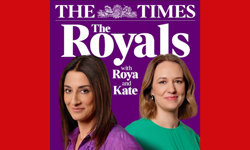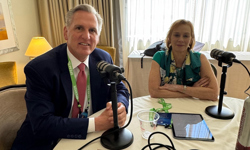
In October 2018, The Guardian launched Today in Focus, a daily news podcast, hosted by the paper’s joint political editor Anushka Asthana. It is not the first time The Guardian has produced a daily news podcast. In 2006, it brought out Newsdesk, which went on to become Guardian Daily. Christian Bennett, global head of video and audio at The Guardian, believes the time is ripe to revisit the concept, with podcasting once again on the up, both in terms of audience appeal and from a commercial point of view.
“Newsdesk was our most successful podcast at the time, but it was a different market then. They had not really figured out dynamic ad insertion, or how to monetise podcasts unless you were getting direct sponsors and direct sponsors were quite hard to get,” Bennett explains.
Now, he says: “Podcasts have got more popular. It’s an interesting thing that the user case for it seems to have grown and the funding seems to have grown at the same time. We actually make money off our podcasts here which is really important in the big mission of The Guardian.”
Programme format
Today in Focus is well-resourced with a team of six audio journalists producing the programme every weekday, focusing on one major news story, together with an opinion piece. Subject matters switch between the domestic news agenda and international affairs and topics are covered in a variety of formats including interviews between the host and a reporter with in-depth knowledge of the subject, set piece interviews with guests and vox pops out and about on location.
The podcast is executive produced by Nicole Jackson, a former commissioning editor on G2 and features editor on The Guardian Weekend magazine, alongside multimedia producer, Phil Maynard. Other team members include Mythili Rao, who joined the team as lead producer from The New Yorker Radio Hour, and India Rakusen, who joined from BBC Digital Current Affairs as senior producer. The Guardian has joined forces with Acast as its official advertising partner for Today in Focus and the programme’s launch sponsor was Bose.
Bennett and his team have faith in the potential of podcasts, which he says are “a really successful format for journalism in general”. The Guardian has been a major player in this field for more than a decade and in the last year, has produced 550 podcast episodes on subjects ranging from politics to books to science. Its Football Weekly podcast is consistently listed in the top five sports podcasts on iTunes and has twice sold out the London Palladium.
“They provide a really good user experience. When your hands and eyes are busy, you get a chance to listen to something that feels quite intimate. Because it’s on demand, it can fit in with your life, which to a slightly younger audience has always made sense,” says Bennett.
He adds: “It’s a really good format for discussion, and it does a good job of humanising our journalism.”
The host of Today in Focus, Anushka Asthana, began her journalistic career at The Observer, The Guardian’s sister paper, and has plenty of broadcasting experience under her belt, having worked as a political correspondent for Sky News and as co-presenter of Peston on Sunday. “Audiences warm to her. She’s super smart and she really bought into the idea,” says Bennett. “It’s important when you are interviewing journalists, that they have someone who is friendly, but who also respects and understands what they do.”
Youth appeal
In general, the audience for The Guardian’s podcasts is younger than the readership of the newspaper. Today in Focus has not been running for long enough to have collected meaningful data, but the company did some research before its launch which showed their podcast audience is “generally young, left leaning, urban, well-educated” and the majority are aged between 20 and 30.
“One of the things we’ve learnt to be comfortable with is that our podcast audience isn’t the same as our newspaper audience or as someone who follows us on Twitter. There’s crossover, but there’s some difference as well. I think it’s really important to be able to find a new, younger audience in a way that isn’t patronising, but also at the same time explains things,” says Bennett.
Appealing to this youthful audience has informed the style of Today in Focus, but that does not mean ‘dumbing down’. Bennett explains: “We want it to be just as accessible to podcast progressives, who might not be familiar with The Guardian, as to people who are familiar with The Guardian and have never listened to podcasts before. I don’t think it’s specifically about aiming for a younger audience, because when you do that, especially if you are an established brand, you can get yourself in trouble. It’s about making it accessible to everyone, being informal, being interesting, being funny when you need to be funny, but also taking time and space to respect your contributors and reflect your audience. If you go too far down the line of youth programming, it just ends badly for everyone.”
The length of the podcasts allows for more in-depth reporting. Bennett says: “Not everybody reads every single article on everything, especially with the way the news cycle is now. People don’t want to feel stupid. They want a route into Brexit to understand what it is. This format can really go deeper into a subject than I think traditional broadcast news can. Generally, our main story on Today in Focus is about 15 minutes long. That’s a long time to talk to someone about a story and really get to the bottom of it. The biggest test is, if you know absolutely nothing about the Honduran justice system, would you be interested? And if you’ve read two articles about it, is there also something new for you there? Because we have a younger audience, we can be slightly more informal. We don’t have to follow all the formal codes and conventions of broadcast news.”
Advertising opportunities
This longer format also means that advertising when it comes is less intrusive. “I don’t think it’s a bad deal for the audience. When you saw people trying to insert a ten second ad into a three-minute social, it was a bad deal for the audience and people quickly figured this out. Three 30-40 second ads over 20-30 minutes isn’t a particularly bad deal for the audience. There has always been a culture of people accepting that level of advertising in podcasting.”
Podcasting, along with video and social, is now an integral part of The Guardian’s news operation. “The Today in Focus team have done a brilliant job of plugging into the newsroom, being in forward planning and talking to editors.”
Sometimes, a journalist will mention something at morning conference which they do not have space for in the main print story which will work well for Today in Focus. “It gives them an opportunity to tell extra bits of their story, really unpick it for a new audience.”
Play to your strengths
It has been important for The Guardian to find a unique voice in the realm of podcasting. Bennett admits: “I think we’re still finding our feet. What makes us unique is we are an English language European progressive voice.” He adds: “We’ve got offices in the US and in Australia and we’ve got an incredible amount of brilliant foreign desk reporters, but I don’t think we can ever hide from the fact that our main newsroom is in the UK and it’s recorded out of here. We try to make everything as accessible as possible to a global audience without taking the edge off it.”
In the US, there are lots of podcasts focusing on Trump and Bennett believes that if The Guardian tries too hard to emulate them, it will always end up being second best. On the other hand, there is the behemoth of the BBC with its vast array of podcasts. “At our best, we’re allowed to do something that they’re not allowed to because of the charter. The way we’re funded by a trust allows us to be opinionated and do our own thing. We have to be fair and we have to be really good at journalism, but we don’t have to strive for the same sense of balance.”
Looking to the future of audio, The Guardian has just set up a small “voice lab” team working with Google and their Google Assistant platform, looking at voice recognition technology and smart speakers. “It’s really important when new technology comes up, as we did with podcasting, as we have done with things like virtual reality and video, that we get in there and have a look at it and see whether it can be useful for us and for journalism in general,” says Bennett. The audio team is also looking at launching a number of flagship mini-series in 2019.
Bennett concludes: “What’s exciting about podcasting, is it’s a real good deal for the audience and if you get it right, it’s a good deal for the publisher as well. But you do have to think about it. Some people might see this as easy: you get a few microphones, stick everyone in a room for an hour and it’s going to be fine. There’s a hell of a lot of craft that goes into these things and we’re lucky to have a brilliant team here to work on that.”










